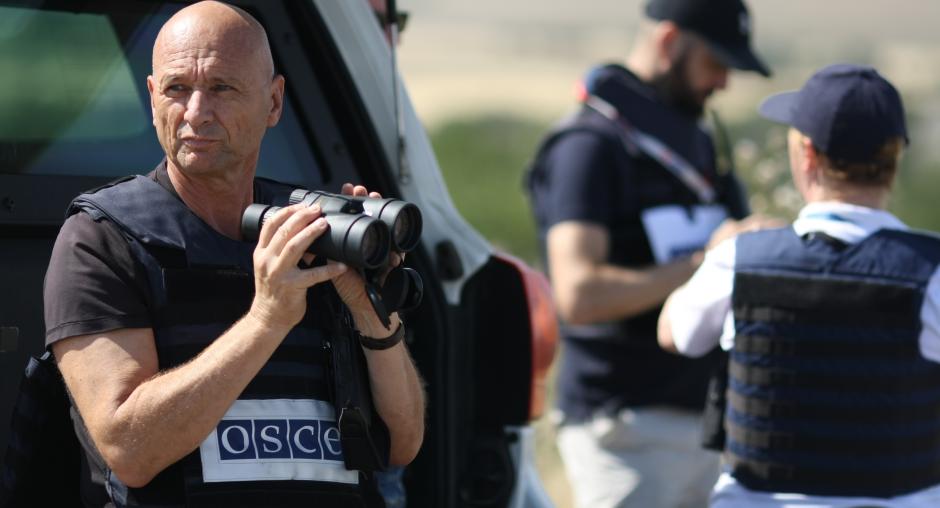Forward Patrol Bases: Two Years on the Contact Line
The OSCE Special Monitoring Mission to Ukraine (SMM) opened its first forward patrol bases on 26 September 2015 in Volnovakha and Novoaidar, in eastern Ukraine. It now successfully operates 10 such offices in both government- and non-government-controlled areas, enabling a permanent presence of monitors close to the contact lines where most incidents take place. In conflict-affected cities such as Debaltseve or Horlivka, they can interact better with the local population on a daily basis.
On a recent day in Debaltseve, an SMM patrol departed at 9:00 AM for Nikishyne, a small settlement that was heavily damaged in the 2014-15 fighting. On the way, they stopped at two checkpoints, where they asked the officials checking documents about documentation policies for minors travelling with a lone parent. Such children are frequently denied permission to cross at certain checkpoints and must, therefore, return home.
In Nikishyne, they spoke with the head of the local administration to gather data on the number of children in the village, where they go to school, and how they get there. Children living close to the contact line often face long journeys to attend functioning schools, sometimes passing by areas which have been shelled, and documenting these hazards is an important part of the SMM’s monitoring of the security situation.
The forward patrol bases are an important innovation for our mission. Since we introduced them, we have increased our presence in eastern Ukraine and completed more patrols near the contact line, where our presence is essential for monitoring the Minsk Agreements.
Olga Scripovscaia Donetsk Team Leader
The SMM also monitors the implementation of Ukraine’s National Action Plan on UN Security Council Resolution 1325 on Women, Peace and Security. The patrol members, therefore, asked about response mechanisms in the village for sex- or gender-based violence, and women’s involvement in local and national affairs. They also visited the villages of Olkhovatka and Bulavynske and the city of Yenakiieve, where similar topics were discussed.
The Debaltseve base is a two-hour drive from the team’s headquarters in Donetsk city. Monitors stay here a week at a time, eliminating a time-consuming daily journey across potholed roads and enabling them to complete the same number of tasks on a single patrol that would otherwise take several days.
“The forward patrol bases are an important innovation for our mission,” Donetsk Team Leader Olga Scripovscaia said. “Since we introduced them, we have increased our presence in eastern Ukraine and completed more patrols near the contact line, where our presence is essential for monitoring the Minsk Agreements.”
The SMM opened its tenth base, in Popasna, on 24 June, and it has plans to establish more, especially in areas not controlled by the government close to the unsecured border with the Russian Federation. But this cannot happen until those who are in effective control of these areas provide security guarantees for the Mission’s work.
The security of monitoring officers is a constant concern, underlined by the death of an SMM patrol member and the injury of two others in April, when their vehicle was struck by an explosion, probably from an anti-tank mine, in Pryshyb, Luhansk region.
Even after the incident in Pryshyb, our team remains committed to fulfilling the SMM mandate by contributing to bringing peace to the people through our monitoring and reporting and interaction with them.
Jukka Tuononen, Luhansk Team Leader
“Even after the incident in Pryshyb, our team remains committed to fulfilling the SMM mandate by contributing to bringing peace to the people through our monitoring and reporting and interaction with them,” said Jukka Tuononen, Luhansk Team Leader.
Some of the forward patrol bases, such as Pokrovsk and Kadiivka, are staffed on a permanent basis, while in Debaltseve, Popasna, Stanytsia Luhanska and elsewhere patrols of three or more monitoring officers rotate in and out of the stations several times a month. The bases are equipped with shelters, and monitoring officers can be re-deployed quickly if fighting intensifies in the area.
But what really makes a difference in the work of forward patrol bases is that the monitoring officers are embedded in the community around the clock, Tuononen explained.




